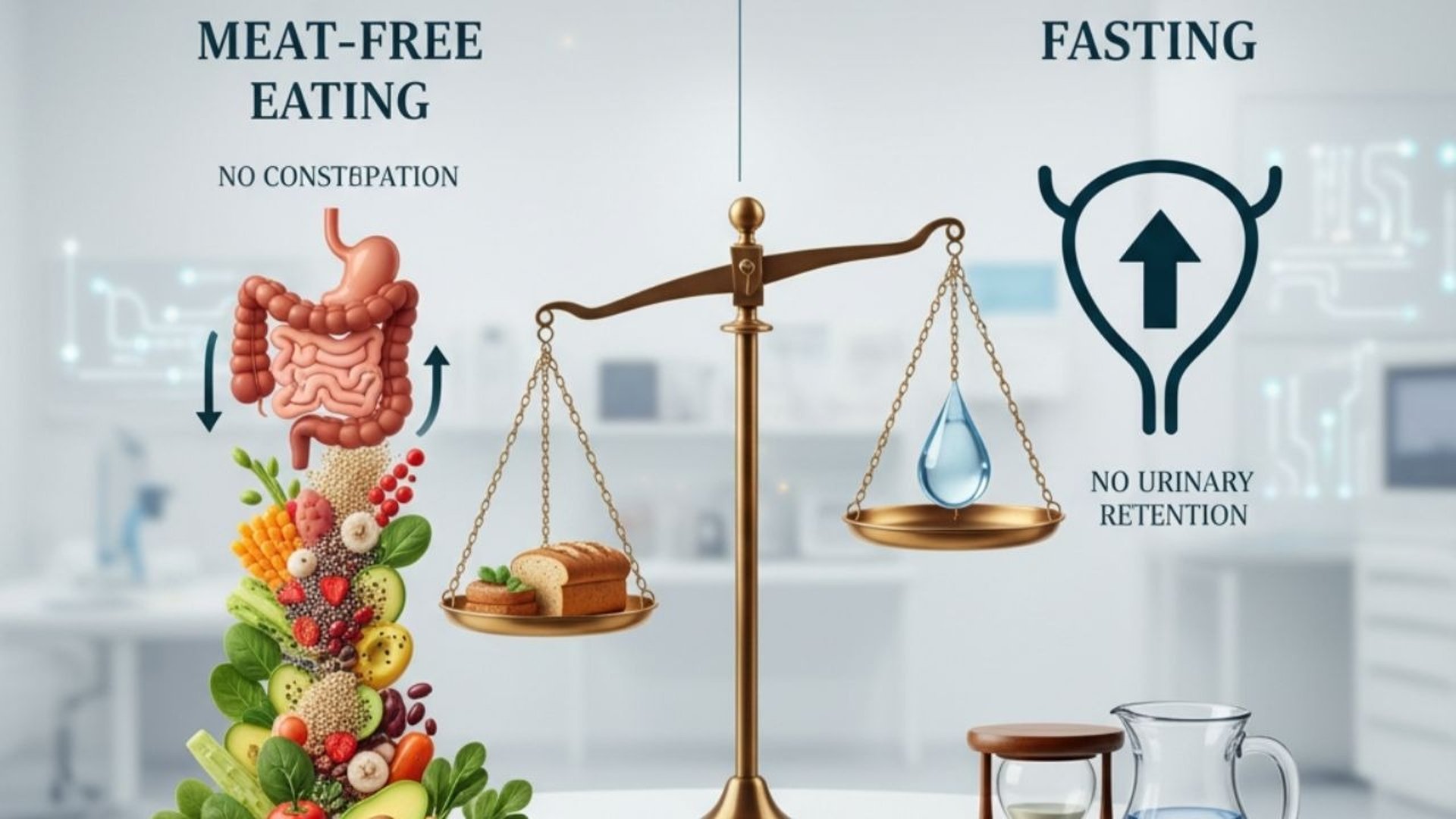
Health is a crown on the heads of the healthy that only the sick can see.

🍖🌙Meat-Free Eating and Fasting : no constipation no urinary retention🥗🚫
🥗🚫Discover how a meat-free diet combined with voluntary fasting can naturally prevent constipation and urinary retention, .🍖🌙
FASTINGGENERAL
Dr Hassan Al Warraqi
9/6/202510 min read


🍖🌙Meat-Free Eating and Fasting : no constipation no urinary retention🥗🚫
🥗🚫Discover how a meat-free diet combined with voluntary fasting can naturally prevent constipation and urinary retention, while supporting gut health, bladder function, and overall well-being.🍖🌙
Adopting a meat-free eating plan along with planned fasting may lead to positive changes in your digestion and how well you control urination through easing constipation and promoting good urinary flow.
The following text discusses the scientific basis and health aspects related to these habits, paying close attention to how they affect constipation and urine control.
Meat-Free Eating for Constipation
Following an eating plan that does not include meat, like vegetarian or vegan diets, has a strong that can help in easing constipation, mainly because of the high amount of dietary fiber it provides.
High amount of Fiber: Eating plans based on plants have a large amount of both soluble and insoluble fiber that comes from fruits, vegetables, beans, and whole grains.
Soluble fiber takes in water, making stools softer, while insoluble fiber gives more mass, helping regular bowel movements.
Meat has no fiber, and does not help digestion in the same way.
What the Proof Shows: Studies indicate that those who follow vegetarian or vegan diets have bowel movements more often and softer stools as against meat-eaters, largely because of more consumption of fiber.
One study in 2019 that appeared in Nutrients showed that eating plans based on plants can increase how often one has bowel movements by 30% as against eating plans that include everything.
Keep in Mind about Processed Foods: It is to be noted that not all meat-free eating plans are equal.
Eating plans that have a high amount of processed foods which are low in fiber (like refined flours or sugary foods) may still cause constipation.
It is important to eat whole, plant-based foods to get the most benefits.
Meat-Free Eating and Urine Control
The relation between meat-free eating plans and improved urine control is fairly direct, but backed by ways that promote good urinary health.
Less Irritation to the Bladder:
Eating red meat can cause irritation to the bladder because of how acidic and high in sodium it is, thereby bringing down its pH level and leading to discomfort while urinating.
Eating plans based on plants and have a lot of alkaline-based foods like vegetables might help reduce this irritation, resulting in better bladder health.
Good Prostate Health:
For men, eating a high amount of red meat has been linked to a higher risk of benign prostatic hyperplasia (BPH), a situation that causes urine retention.
A study in 2020 that appeared in The American Journal of Clinical Nutrition showed that eating plans based on plants bring down the risk of BPH that has symptoms by 25% as against eating plans that have a high amount of meat.
Indirect Goodness via Constipation Relief:
Constipation is capable of putting stress on the bladder, making urine retention more severe. Through relieving constipation by fiber consumption, eating plans based on plants support urine function in fairly direct manner.
Good Urological Health Overall:
Eating plans based on plants are related to lower risks of UTIs and better bladder function, to some degree because of a better urine pH and less inflammation.
Important Note:
Urine retention may arise from different health issues (like nerve issues or structural abnormalities).
While a meat-free eating plan promotes better urine health, do seek medical help from a professional when symptoms persist for examination.
Planned Fasting: Good Points for Digestive and Urine Health
Fasting done on purpose, like intermittent fasting or time-restricted eating, go well with a meat-free diet by enabling rest from digesting food and bettering metabolic health, which can also help lower constipation and promote good urine function.
Resting the Digestive System:
Fasting enables the digestive system to rest, thereby enabling the migrating motor complex to clear left-over waste, relieving bloating, and helping regular bowel movements.
A study done in 2021 that appeared in Frontiers in Nutrition indicated that intermittent fasting betters gut movement, thereby helping constipation relief.
Metabolic Changes and Autophagy:
When fasting, the body changes from taking glucose to taking up fat metabolism, making ketones.
This process, along with autophagy (cleaning up cells), lowers inflammation and promotes tissue repair, potentially helping the bladder and gut.
Lowering Inflammation:
Fasting lowers overall inflammation, a key factor in chronic diseases that may impact digestion and urine systems.
A study done in 2018 that appeared in Cell Metabolism indicated that intermittent fasting lowers inflammatory markers by close to 20%.
Other Good Points:
Fasting helps weight control, better insulin actions, and helps heart health, all of which help total metabolic health and help digestion and urine function without doing much.
Things to Consider:
Fasting has to be handled with caution. Long durations of fasting can result in not enough nutrients, being dehydrated, or loss of energy, especially when not well planned. Those who have situations like diabetes or eating disorders must speak with a doctor before fasting.
Putting Together Meat-Free Eating and Fasting: A Cooperative Plan
The putting together of a meat-free eating plan and fasting done on purpose can make the good points for health even more clear:
Better Digestion:
Eating a high amount of fiber through plant-based foods with fasting periods helps the good microbes in your gut thrive and make bowel movements regular, thereby bringing down constipation risk.
Better Metabolic Health:
Both habits better insulin actions and lowers inflammation, helping overall health and potentially relieving situations related to urine retention.
All-Encompassing Benefits:
Putting them together promotes weight control, lowers risk of chronic disease, and helps cell repair, building a strong base for digestion and urine health.
Key Aspects and Caveats
Not for everyone: While a meat-free diet and fasting can lower constipation and help urine health, they are not guaranteed to work.
Eating plans based on plants that are poorly planned (for example, low in whole foods) or fasting done incorrectly may cause deficiencies of nutrients or other health problems.
Asking a Doctor:
Long term constipation or urine retention may mean there are underlying issues that need medical help.
Diet and fasting are supportive ways, and not substitutes for professional treatment.
Personal Factors:
Health results vary based on personal aspects like how much water one intakes, how active one is, and health situations that happened before.
Speaking with a doctor or dietitian makes sure that the plan is based on one's situation.
In Closing
A well-planned meat-free diet, has a lot of fiber from plant based foods, greatly lowers constipation by helping regular bowel movements and helps urine health through lowering bladder irritation and making prostate health better.
Fasting done on purpose makes these good points more clear through giving a break from digesting, lowering inflammation, and helping metabolic health.
These habits, when put together, give a powerful, cooperative approach to bettering digestion and urine function, but they must be put into practice with planning and professional guidance to keep clear from risk.
+++++++++++++++++++++++++++++++++++
FAQs: Frequently asked question Meat-Free Eating, Fasting, and Their Benefits
Presented by: Dr. Hassan Al-Warraqi – Physician and Researcher in Integrative Medicine
Simplifying medical knowledge to promote holistic health through sustainable dietary practices.
1. How exactly does a meat-free diet help prevent constipation?
A meat-free diet, particularly one rich in whole plant foods like fruits, vegetables, legumes, and whole grains, is exceptionally high in dietary fiber.
This fiber comes in two forms:
Soluble fiber: Absorbs water to form a gel-like substance, softening the stool.
Insoluble fiber: Adds bulk to the stool, which helps it move more quickly through the digestive tract.
Since meat contains zero fiber, replacing it with high-fiber plant foods significantly increases stool bulk and frequency, preventing and easing constipation.
2. Can a plant-based diet still cause constipation?
Yes, if it is poorly planned. A meat-free diet that relies heavily on processed foods (e.g., refined carbohydrates, sugary snacks, and low-fiber convenience foods) can still lack sufficient fiber.
To gain the digestive benefits, the diet must be centered on whole, unprocessed plant foods with adequate water intake.
3. What is the connection between not eating meat and better urinary control?
The connection is supported by several mechanisms:
Reduced Bladder Irritation: Red meat can be acidic and is often high in sodium, which may irritate the bladder lining. Plant-based diets, rich in alkaline-forming foods like vegetables, can create a less irritating urinary environment.
Prostate Health (for men): High red meat consumption is linked to an increased risk of Benign Prostatic Hyperplasia (BPH), which can cause urinary retention. Plant-based diets are associated with a lower risk.
Relief from Constipation: Chronic constipation can put physical pressure on the bladder. By preventing constipation, a high-fiber diet indirectly supports better urinary function.
4. Is voluntary fasting safe for everyone?
No. While beneficial for many, voluntary fasting (like intermittent fasting) is not suitable for everyone.
It should be approached with caution or avoided by:
Individuals with diabetes, especially those on medication.
People with a history of eating disorders.
Pregnant or breastfeeding women.
Those with certain chronic health conditions.
It is essential to consult a doctor before starting any fasting regimen to ensure it is safe for your individual health status.
5. How does fasting improve gut and urinary health?
Fasting provides two primary benefits:
Digestive Rest: It allows the digestive system to fully rest, enabling the "migrating motor complex" to efficiently clear out residual waste, reducing bloating and promoting regularity.
Reduced Inflammation: Fasting triggers metabolic changes like autophagy (cellular cleanup) and lowers systemic inflammation. Since inflammation is a key driver of many chronic issues, reducing it can benefit both gut and bladder tissue health.
6. Can I just fast without changing my diet to get these benefits?
While fasting alone can offer benefits like digestive rest and reduced inflammation, the greatest synergistic effect comes from combining it with a nutrient-dense, meat-free diet.
A diet high in plant-based fiber ensures that during your eating windows, you are providing your gut with the necessary fuel for health.
Fasting without a healthy diet may not address issues like low fiber intake or bladder irritation from specific foods.
7. I have chronic urinary retention. Will switching to this plan cure it?
Not necessarily, and you must see a doctor.
Urinary retention can be a symptom of serious underlying conditions (neurological issues, structural abnormalities, etc.).
A meat-free diet and fasting can be excellent supportive strategies to reduce irritation and inflammation, but they are not a substitute for a professional medical diagnosis and treatment plan. Always address persistent symptoms with a healthcare provider.
8. What is the most important thing to remember when starting this approach?
The key is planning and professional guidance.
Diet: Focus on a variety of whole plant foods to ensure you get enough fiber, protein, vitamins, and minerals.
Fasting: Start slowly (e.g., a 12-hour overnight fast) and listen to your body.
Hydration: Drink plenty of water, especially when increasing fiber intake and during fasting periods.
Consult a Professional: Speak with a doctor or a registered dietitian to create a plan tailored to your specific health needs and goals.
—-------------------------------------------------
Dr. Hassan Al-Warraqi's Suggested Regime: Fasting & Controlled Meat Consumption
This proposed regime is designed to leverage the benefits of intermittent fasting and a primarily plant-based diet with very limited meat intake.
The goal is to promote digestive health and prevent issues like urinary retention and constipation.
Part 1: The Weekly Fasting Schedule (Thursday, Saturday, Sunday)
Fasting on these specific, non-consecutive days is a core component.
This pattern allows for digestive rest and metabolic reset.
How it Works: On these three fasting days, you significantly reduce your calorie intake. A common and manageable approach is the 5:2 method, where you consume only about 500-600 calories on fasting days.
What to Eat on Fasting Days: These calories should come from nutrient-dense, low-calorie foods such as:
Vegetables: Broth-based vegetable soups, small salads without heavy dressing, steamed greens.
Fruits: A small apple, a handful of berries.
Liquids: Plenty of water, herbal teas (like peppermint or ginger), and black coffee.
Benefits of This Fasting Schedule:
Digestive System Rest: Gives the gut a prolonged break, reducing bloating and allowing for better regulation of bowel movements.
Autophagy: Triggers the body's cellular cleanup process, reducing inflammation.
Improved Insulin Sensitivity: Helps the body manage blood sugar more effectively.
Part 2: The Weekly Eating Plan (On Non-Fasting Days)
On the four days you eat normally (Monday, Tuesday, Wednesday, Friday), you follow a structured plan with minimal meat.
The Rule: Only two days per week include meat.
One Day for Chicken: Consume a lean poultry source (e.g., grilled chicken breast).
One Day for Red Meat: Consume a lean red meat source (e.g., a small portion of lean beef or lamb). It is crucial to keep this portion moderate (e.g., the size of a deck of cards).
The Other Two Eating Days are Strictly Meat-Free: These days should be fully plant-based, focusing on:
High-Fiber Foods: Vegetables, fruits, whole grains (oats, brown rice, quinoa), and legumes (lentils, chickpeas, beans).
Other Proteins: Eggs, yogurt, and plant-based proteins like tofu or tempeh.
How This Regime Helps Prevent Urinary Retention and Constipation
Prevents Constipation:
High Fiber Intake: The four plant-based eating days and the fiber-rich foods on fasting days ensure a very high dietary fiber intake. Fiber adds bulk to stool and softens it, making it easy to pass.
Hydration: Fasting emphasizes drinking fluids, which is essential for fiber to work properly.
Healthy Gut Microbiome: A plant-centric diet feeds beneficial gut bacteria, which are crucial for healthy digestion.
Prevents Urinary Retention:
Reduced Bladder Irritation: Limiting red meat to just one day significantly reduces potential irritants and acidity that can affect bladder function for some people.
Healthy Prostate: For men, reducing red meat intake is linked to a lower risk of Benign Prostatic Hyperplasia (BPH), a common cause of urinary retention.
Less Physical Pressure: By preventing constipation (a key feature of this plan), there is less pressure on the bladder from a full colon, allowing it to function more efficiently.
Extremely Important Considerations & Warnings
This is a General Guide: This regime is interpreted from your query. It is not an official prescription from Dr. Al-Warraqi.
You must consult a doctor or a registered dietitian before starting, especially if you have any health conditions.
Listen to Your Body: Fasting can be demanding. If you feel unwell, break your fast.
Portion Control is Key: The benefits depend on meat portions being small and lean. Overconsumption on meat days will negate the positive effects.
Who Should Avoid This? This plan is not suitable for:
Pregnant or breastfeeding women.
Individuals with a history of eating disorders.
People with diabetes, kidney disease, or other metabolic conditions.
Those taking medications that require food.
Underweight individuals or those with nutritional deficiencies.
Disclaimer: This information is for educational purposes only. It is crucial to speak with a healthcare professional like Dr. Hassan Al-Warraqi or another qualified doctor to get personalized and safe advice tailored to your health profile.
==================================
Dr. Hassan Al-Warraqi – physician and researcher in integrative medicine at h-k-e-m.com. He simplifies medical knowledge for the public, highlighting the benefits of meat-free nutrition and fasting in preventing digestive and urinary problems, and promoting holistic health.Simplifying medical knowledge to promote holistic health through sustainable dietary practices.https://h-k-e-m.com/meat-free-eating-and-fasting-no-constipation-no-urinary-retention
++++++++++++++++++++++++++++++++++
🌙 “Is Fasting Superior to Medication in Diabetes Management?”
Keyword: fasting vs medication diabetes
https://www.h-k-e-m.com/-is-fasting-superior-to-medication-in-diabetes-management—--------------------------------------------------------------------------------------------------------------------------------------------------------------------------------------------















Get in touch
Address
Cairo Al Rehab
Contacts
+20 109 405 2056
hassanalwarraqi@h-k-e-m.com
